
Prologue
It takes a village to raise your kids, and it takes a global village to raise your children. Through this series, “Mumma’s Bindis”, the author shares the stories of the joys of raising two young children in a humanist culture. The central characters of this series are Urja (nickname Momo) and Ujaan, growing up in a Midwestern college town in North America. Born from the hearts of immigrant parents, they ferry between their hyphenated identities spread across two continents. Mumma’s Bindis is the reality of children rooted to the soil they come from yet adapting every day to the dichotomies of the world they belong. A mother recounting the bliss and dares of motherhood. This is the fourth episode of this series.
Going to Barisal
Yesterday just as the sun was painting a palette of colors on the distant horizon, they arrived at the banks of the river Kirtankhola in search of Didan’s roots. At Dhaka’s Sadar Ghat amidst sleeping buffaloes and hyacinths, they had boarded the steamer to Barisal the night before. It had a garland of light around its decks and slippery steps leading up to their VIP cabin that could easily sleep five people. Mumma had reserved two cabins side by side, enough room to fill the nine travelers in their party. Didan was the reason they were going to Barisal. They were going to find the village by the banks of the river Gouri, where she was born. All she had were fragments of memory: the playground she played in, names of uncles that lived next door, and the dhaak playing the return of Uma to mark the beginning of Durga Pujo. She had held on to those for years, through elementary and high school, college and university, marriage and child-bearing, and loss of her parents and siblings. As they boarded the steamer, Urja and Ujaan held Didan’s hands. They held on to those hands all through the journey to her roots.
Their party of nine was quite an interesting bunch. Didan was the eldest member of the team. She was eighty-one, and Ujaan the youngest member barely “onety-one”! Rima didi and Bulbul mashi took care of Didan, so of course they came along on the trip. Then there was Butun mashi, Mumma’s first cousin. Since coming to Bangladesh, Urja and Ujaan have started calling her Butun mashi khala: when in Rome, do as the Romans do. Mumma’s dear friends Afroz aapa and Monar bhai from Dhaka decided at the last minute to accompany them to Barisal. After all, it’s always nice to travel with locals, plus Ujaan felt better to have another man in the party!
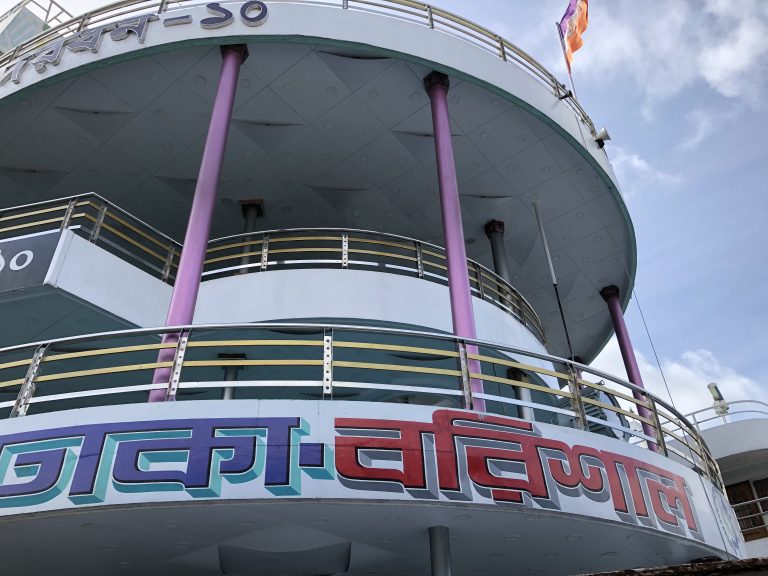
Dinner on the steamer was yummy! They had rice, yellow daal, fried eggplant, fish curry, and fresh mango slivers. Then came Urja’s most favorite dessert on earth. Blackish-brown pantuas soaked in sugar syrup. Ujaan wished Mumma knew how to make these. The restaurants in Ann Arbor only serve gulab jamuns, and they are not even half good as their Bengali cousins, the pantuas! After dinner, Didi and Ujaan climbed on to their bunk beds. The steamer was swaying in the gentle waves of the river Shitolakha. Someone was singing a tune in the distant “Amaay bhasha-ilee re-e, amaay dooba-ilee re-e-e-e, okuul dariyar bujhi kuul nai re” (You have set me adrift, you are letting me drown, the river seems endless as if there were no shore). Urja and Ujaan feel asleep listening to Mumma recite the names of the rivers they will cross: Shitolakha, Padma, Meghna, Arialakha…. The names almost sounded like musical notes!
When they arrived by the banks of Kirtankhola, the birds were just waking up. Urja rushed to get Didan ready. Rima didi was pouring tea from the thermos they had brought along. Didan can’t move a finger without her first sip of bed tea. Afroz aapa carried projapati biscuit in her rucksack. Everyone got one with their cup of tea, Ujaan got an extra as a reward for the early rise. Breakfast would have to be in Barisal town once the roadside food stalls open. But itinerary for the rest of the day was plain and simple. They were going to hop on a van, almost the size of a minibus, and go find Didan’s house in Sholok village.

It was about an hour’s drive from Barisal town to Didan’s village in the Batajor district. Along the way, they saw wind swaying the paddy fields, coconut trees that bent over green waters, and riots of yellow in the mustard fields. A bamboo bridge and a lone goat under a neem tree welcomed them to Sholok village. Now they had to find Didan’s ancestral house. A fortnight back, Urja and Ujaan had visited Wordsworth’s house in Grasmere, England. Amidst speculations and questions about whether her house had iron door-knockers and grasshopper filled garden like Wordsworth’s, all Didan could remember was that they had two ponds (referred to as “pushkorini” locally) in the premises, “one in the front and one on the back of the house”. She remembered Brojobashi Chakraborty, a gnyati grandfather from a third cousin’s side. So their van stopped by neem and banyan trees, elderly men sipping tea at local tea stalls, young boys playing lattu in clusters, and cattle lazing in the sun. Afroz aapa stretched her head out of the van window and asked whether the village elderly knew a Brojobashi Chakraborty, or any Hindu household in the village. Butun mashi khala was good at remembering history. She proudly added details of the family’s involvement in the freedom movement of India. “Didan’s father was hailed as the Gandhi of Barisal”, she told Urja Ujaan, so surely somebody in the village would remember that piece of history! Finally the nephew of the local high school headmaster brought the good news “khobor pawa gyachhey” (yes, we got news)! Monar bhai and Ujaan, the two men in the group jumped out of the van and ran with the nephew to confirm the accuracy of the news.
The rest of the group took time. They breathed in the air around them. Then they walked by the two ponds that Didan had remembered, one in the front and one on the back. Second, third, fourth cousins’ grandchildren and their wives emerged from different corners of the family house, and welcomed them to the house. The women brought out chairs on the “dawa” and hand-held fans made of dried leaves. They sent their men to pick green coconuts from the trees, and served bowls of parched rice and golden yellow mangoes. They talked and laughed, called Didan “thakuma” and marveled at how fair her skin was. They begged Mumma and the whole gang to stay for a simple lunch of rice and fish from the pond. Afroz aapa went to pick “mankochu” from the nearby fields. Monar bhai turned the data on his mobile phone and played youtube videos of Mumma’s songs, and the “dawa” filled up with music and aroma from the nearby trees.

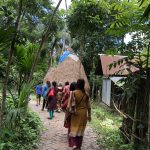
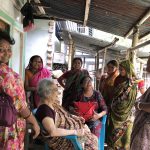
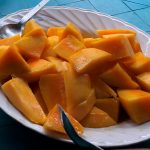

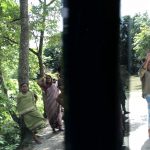
When it was time to leave, the whole village came to bid Didan farewell, through laughter and prayers and promises to come back again. In her white embroidered handkerchief, Didan packed a handful of soil from the ground that was once her family home.
You see, there is a thread that connects us in strange ways, sometimes unbeknowst to us. You just have to hold on to that thread and believe that in the end it will lead you to the coconut tree bending over its shadow on the dark pond.
Glossary of terms:
Didan: grandmother, mother’s mother
Dhaak: a traditional drum, played during Durga Pujo, the most celebrated festival of Bengalis.
Didi: a doting generic name for an elder sister, by birth or by choice
Mashi: a doting generic name for mother’s sister, by birth or by choice
Khala: name for Mashi in Bangladesh
Aapa: name for Didi in Bangladesh
Bhai: a doting generic name for a brother, by birth or by choice
Pantua: a typical Bengali sweet deep fried and dipped in sugar syrup
Gulab Jamun: North Indian version of Pantua
Projapati: Butterfly
Neem: a medicinal plant
Gnyati: a distant relative
Lattu: spinning toys
Dawa: a long open verandah, which is usually part of the house
Mankochu: a type of taro root, cooked as a Bengali delicacy with mustard and coconut
Thakuma: Father’s mother
Mousumi Banerjee is Professor of Biostatistics at the University of Michigan (USA). She lives in a world of science, trying to make sense of data to take cancer research and treatment forward. But her passion and affinity for the arts gives her sustenance and counterbalances her work as a scientist. Mousumi writes in both Bangla and English. Her work has been published in many literary magazines in USA, India, and Bangladesh, including Telegraph, BanglaLive, Keyapata, TechTouchটক, Antonym, Sahitya Café, Irabotee, Golpopath, Swinhoe Street, Batayan, Parabaas, Manush Mecca. A rare feat is her poetry "White Noise" published in the leading medical journal (Journal of the American Medical Association) that gives a humanistic face to cancer. Her collected poems Eklaghor (Room Alone) was published in Kolkata by Yaponchitra. Mousumi lives with her family in Ann Arbor, Michigan.




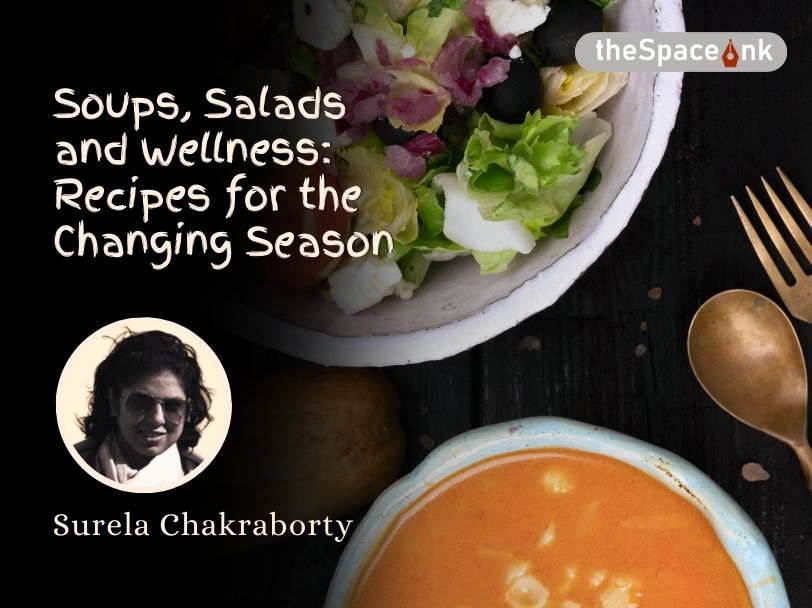
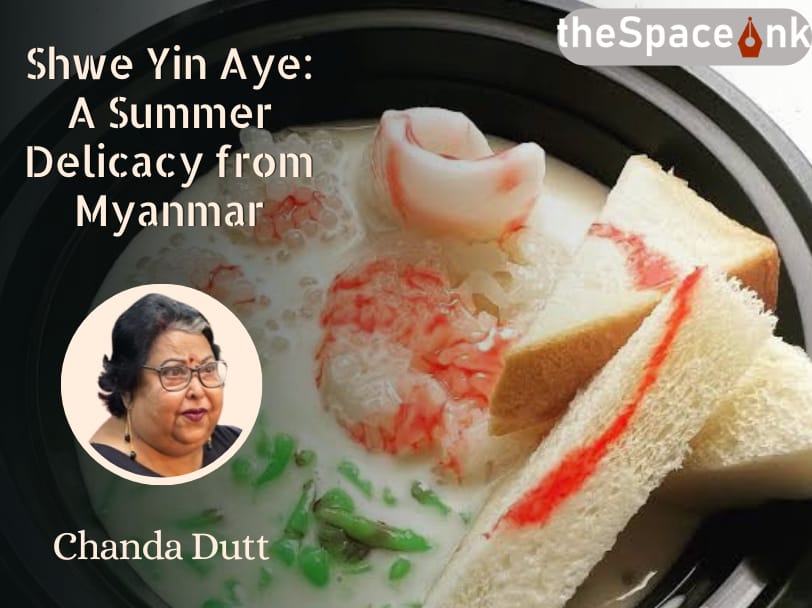


2 Responses
khubi bhalo likhechho- Rickshaw on the Milky Way ta khullo na to-read the other 2 – great job and descriptions – I can connect 🙂
Khoob bhalo – onektai chena chena – epar aar opar – meel to achhei –